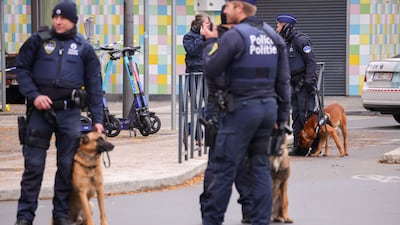The man who shot dead two Swedes in Brussels on Monday has been named as Abdesalem Lassoued, a 45-year-old Tunisian with a history of radicalisation.
Belgian authorities have described the killings as a terrorist attack and said the gunman had been living illegally on Belgian territory.
“He was known to the police for suspected acts of human trafficking, illegal residence and endangering state security,” said Justice Minister Vincent Van Quickenborne on Monday.
Police shot and killed Lassoued on Tuesday morning after an overnight manhunt. He is believed to be the same man who, in a widely circulated video on Monday evening, claimed to have killed three Swedes and to be inspired by ISIS.
Belgian Prime Minister Alexander De Croo said the two Swedish victims had travelled to Belgium for a football match. A third person, a taxi driver, was severely wounded.
Police are searching for the attacker's accomplices, reports said.
The federal prosecutor's office said a witness reported seeing Lassoued in a cafe in the Brussels district of Schaerbeek shortly after 8am on Tuesday. Police arrived on site and shot at him.
Emergency services transferred him to hospital, where his death was confirmed at 9.38am EST.
“A weapon of war and a bag of clothes were found in the cafe,” said the prosecutor's office, which is to launch an inquiry into the incident.
Lassoued lived on the first floor of a building in Schaerbeek with his wife, who worked as a hairdresser, and their young daughter, reports said. He was recently “chased away” from a local mosque for “radical statements,” local mayor Cecile Jodogne told Belgian broadcaster RTBF.
He filed an asylum request in November 2019, which was rejected the following year, said Nicole de Moor, Secretary for Asylum and Migration.
A meeting planned for Tuesday
Police had for several years been receiving information about Lassoued's potential radicalisation but had not believed him to represent an imminent danger for society.
A meeting to discuss his case had been scheduled by police on Tuesday, one day after he shot dead the two football fans, said Mr Van Quickenborne.
He first came to local authorities' attention in July 2016, when a foreign police service told Belgium that he had a “radicalised profile and wanted to go to a conflict zone” to join extremists fighters, said Mr Van Quickenborne.
At the time, Belgium was still reeling from an ISIS-claimed suicide attack that killed 35 people in an underground train and at Brussels international airport. There were “dozens such reports a day, it was a true terror crisis. The information was verified and nothing was done with it,” said Mr Van Quickenborne.
As a result, Lassoued was not included in Belgium's list of people believed to be radicalised, known as Ocam.
This year, an asylum seeker living in the north-eastern region of Campine accused Lassoued of threatening them on social media. They also claimed he had previously been sentenced for terrorism in Tunisia, said Mr Van Quickenborne.
Police in Antwerp, Belgium's second-largest city, had scheduled on Tuesday a meeting of the country's joint information centre, a structure set up after the 2016 terrorist attacks to analyse potential threats.
But police at that time had not considered Lassoued to represent an imminent threat, said Mr Van Quickenborne.
They had received information that he had not been sentenced for terrorism in Tunisia as claimed by the asylum seeker in Campine, but for “common law crimes”, said the minister.
Lassoued had also been seen once in a mosque in June last year “but this did not give rise to other measures”, added Mr Van Quickenborne.


